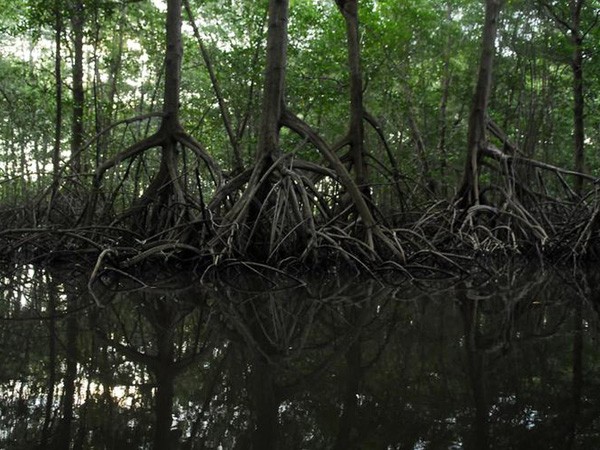FEATURE-Mafia Island protects its hidden climate treasure: mangroves
"When you look up, you only see trees and the sounds of birds," David told the Thomson Reuters Foundation on "Nature Day" at the COP28 U.N. climate summit in Dubai. David hopes this nascent "eco-tourism" project can help fund work to patrol the Marine Protected Area's more than 5,000 hectares (12,355 acres) of mangrove forest on the island in the Indian Ocean off the east African coast, south of Zanzibar.

By Jack Graham DUBAI, Dec 9 (Thomson Reuters Foundation) - On the coast of Tanzania's Mafia Island lies a blue lagoon - a dream-like pool of bright turquoise water, filtered and cooled by the mangroves which surround it.
Ailars David, a marine conservation warden at the reserve, said the plan is to build a boardwalk for tourists to reach the lagoon so they can swim surrounded by nature and the freshest of air. "When you look up, you only see trees and the sounds of birds," David told the Thomson Reuters Foundation on "Nature Day" at the COP28 U.N. climate summit in Dubai.
David hopes this nascent "eco-tourism" project can help fund work to patrol the Marine Protected Area's more than 5,000 hectares (12,355 acres) of mangrove forest on the island in the Indian Ocean off the east African coast, south of Zanzibar. Mangroves act as carbon sinks, absorbing large quantities of planet-heating carbon dioxide emissions, as well as offering benefits - from protecting biodiversity and purifying water to protecting coastlines from erosion as sea levels rise on a warming planet.
Some locals on Mafia Island want to cut down the coastal vegetation as wood for cooking and fires, David said, while the area - popular with divers - is also under threat from tourist developments looking to clear trees to open access to the beach. "Those kind of illegal activities are quite challenging," said David, 27, a marine scientist by profession.
At the COP28 summit, some governments and conservationists are pushing for greater recognition of the role of nature, including mangroves, in tackling the climate crisis. The latest draft of the agreement expected from governments at COP28 recognises the role of nature in reducing greenhouse gas emissions and helping people adapt to climate change impacts.
"Mangroves for Indonesia perform a multitude of critical functions," said Erick Thohir, the nation's coordinating minister for maritime affairs and investment, describing them as "remarkable trees that become guardians for our archipelago". Speaking at a ministerial event at COP28, Thohir said Indonesia has the largest area of mangroves in the world, at 3.36 million hectares, which help protect its coasts and biodiversity, along with providing economic benefits to communities through eco-tourism and carbon markets.
Indonesia belongs to an international alliance of about 40 countries working to coordinate and share knowledge in a bid to protect the world's 15 million hectares of mangroves. In the run-up to COP28, efforts were stepped up to mobilise $4 billion in funding to protect those mangrove forests by 2030.
"We realise the importance of collective efforts and connected solutions with countries across the globe," Thohir said. Throwing money in the sea?
Pieter van Eijk, programme head of deltas and coasts at Wetlands International, a conservation non-profit, highlighted several threats to the world's mangroves, such as shrimp farms and infrastructure development. He warned that many mangrove restoration projects fail because of confusion over land ownership, too much focus on planting mangroves instead of improving the broader environment, and a lack of engagement with communities that rely on them.
"When (communities) don't own a restoration project, the risk is really big that then after the project, they will just do what they used to do," van Eijk said. By investing money in unsuccessful schemes, he added, projects run the risk of "quite literally throwing a lot of money in the sea".
Mafia Island's David hopes that the international interest in mangroves at COP28 can increase finance and capacity-building for the reserve's work such as training staff. "You cannot just plant mangroves anywhere," he said, adding that factors like the soil and pH of water need addressing first. "It requires knowledge in restoring mangroves and most of the practitioners do not have those skills."
David said the reserve is looking to map its conservation areas to understand the amount of carbon sequestered by the mangroves, which could help it tap into markets for carbon credits and emerging biodiversity credits. Ever since he started as a marine scientist, David said he has worked with young people, aiming to develop a network of youth who understand how the ocean works and can take action in their own communities.
"My passion is to mobilise young people and help them to restore the ocean," David said.
(This story has not been edited by Devdiscourse staff and is auto-generated from a syndicated feed.)










